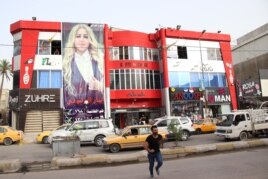11 May, 2018
Iraqi citizens will vote for members of their national parliament on May 12.
It is the first such election since the government declared victory over the Islamic State group. Iraqi forces drove out the militant group from the country's north last year. Now, Iraqis hope that new leadership will fight another enemy: corruption.
Many consider corruption to be the cause of years of war and economic problems.
Some candidates sense this feeling. Iman al-Marsomi is a candidate for parliament. "I want to wage a war against corruption," she said.

New candidates like Iman al-Marsomi, seen in this poster in Baghdad on May 6, 2018, say new leadership will tilt the balance of power toward reform.
But some local people in Baghdad said that goal may be impossible to reach.
Nearly 7,000 candidates are seeking office. There are 329 seats in Iraq's parliament. After the vote, the government will carry out a series of negotiations. It is expected that one of the leaders of the Shia parties will be appointed prime minister. That position is Iraq's head of state.
Iraq's government system is complex and based on a quota system. It calls for several groups to hold leadership positions. They include Shia and Sunni Muslims, the two biggest Muslim religious groups in the country. Kurds, other minorities and women also are required to hold some of these jobs.
New alliances forming
Iraqi political expert Najem al-Kassab told VOA that new political alliances are forming in the country, even among different religious groups. As a result, he said, no party is likely to gain a majority. So, a long series of negotiations will take place before the choosing of top positions, he said.
"It will be difficult for them to agree on the leadership," he said, "because party alliances are no longer based on sectarian blocks."
The current Prime Minster is Haider al-Abadi. He oversaw the defeat of IS militants in Iraq.
But the upcoming vote and negotiations will be hard to predict, al-Kassab said.
For example, one political alliance in Iraq now includes well-known Shia leaders and non-religious parties, including the Communist Party.
Unlike the election in 2014, Sunni voters are more likely to vote for al-Abadi's coalition because of the defeat of the IS. The militant group held mainly Sunni areas between 2014 and 2017.
The conflict destroyed or severely damaged many Iraqi cities, towns and villages.
Al-Kassab said rebuilding, improving the economy and limiting corruption are most important to voters. However, meaningful change will be difficult.
"The people don't really care who is in power," said al-Kassab. "They are looking to rebuild after all the wars."
Protecting voters and the election
Security for the vote remains a concern. IS fighters have threatened to carry out attacks before the elections. The group said in an internet message that it has killed at least one candidate.
Iraqi officials, however, say they can provide enough security and protect voting places.
An Interior Ministry official told VOA that security forces have prepared a "careful" plan for Baghdad and other cities. "Everyone can be assured to vote safely. We will protect the polling stations, the transfer of ballot boxes, and voters," he said.
The government plans to close the country's airports and borders for 24 hours during the election.
Security forces also will suspend travel between provinces and restrict movement of vehicles on Saturday.
The Popular Mobilization Forces in northern Iraq plans additional security measures in areas with political conflict between Kurds and Arabs.
A spokesman for the militia alliance said IS militants had threatened villagers in southern Kirkuk and Hawija with kidnapping if they vote in the election.
"Iraqi forces will be deployed to Hawija and its surrounding areas on the election day to guarantee that everyone votes freely," he told VOA.
I'm Mario Ritter.
Heather Murdock, Rikar Hussein, Mehdi Jedinia reported this story for VOA News. Mario Ritter adapted it for VOA Learning English with add. Caty Weaver was the editor.
We want to hear from you. Write to us in the Comments section, and visit 51VOA.COM.
_____________________________________________________________
Words in This Story
wage –v. to start and continue (a war, battle, etc.) in order to get or achieve something
quota –n. an official limit or amount on people that are permitted or included
sectarian –adj. referring to religious or political groups
blocks –n. a group of people who usually act together in some way
assure –v. to make sure something is done or happens
polling –n. voting
transfer –n. an act or process of moving someone or something from one place to another